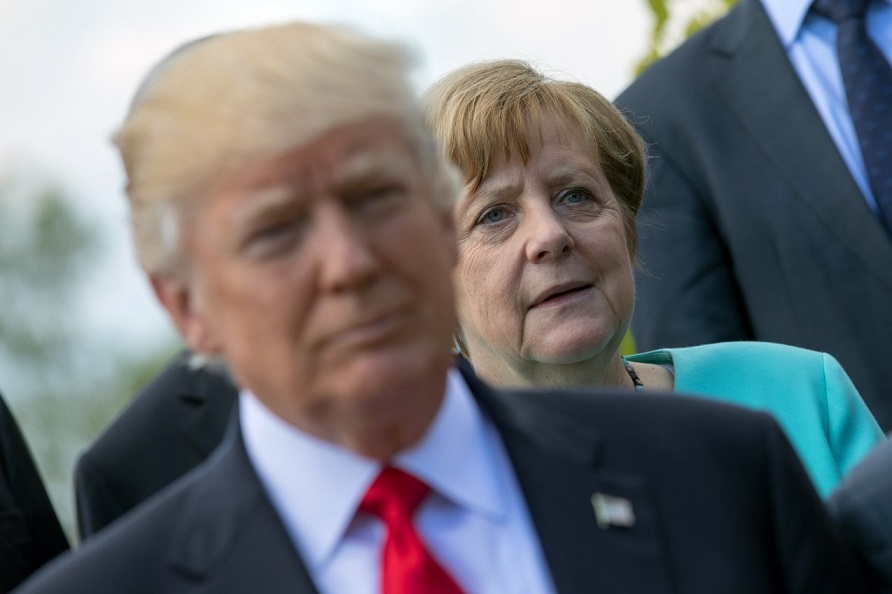German Chancellor Angela Merkel is visiting Azerbaijan today as part of her three-day trip to the South Caucasus – a first for the head of Germany’s government since 2005 – where she is meeting the heads of Azerbaijan, Georgia and Armenia. Some analysts say Merkel is drumming up support against American pressure on Germany to purchase gas supplies from the United States.
During a NATO meeting in Brussels last month U.S. President Donald Trump publicly pressured Germany to ween itself off of dependence on Russian gas and purchase liquified natural gas (LNG) from the U.S. Trump blasted Germany as being “a captive” of Russia, which is currently the largest natural gas supplier to Germany.
Trump termed the Nord Stream 2 gas pipeline project, which could pump 55 billion cubic meters (bcm) of gas per year from Russia to Europe, as a “horrific” pipeline that would only help Moscow strengthen its grip over Europe’s energy security.
Fikrat Sadikhov, professor and political analyst at Western Caspian University in Baku, says Trump’s lambasting of Germany for its growing energy cooperation with Russia has pushed Merkel to schedule a visit to Azerbaijan.
“Natural resources and natural gas projects of Azerbaijan will top Merkel’s discussion agenda in Azerbaijan,” Sadikhov told Caspian News. “Amidst the ongoing geopolitical tensions between the U.S. and Russia, natural gas supplies from Azerbaijan is quite a significant factor for Germany’s energy security.”
“Germany is looking for diverse resources of energy imports [and] does not want to rely on a single country. In this light, the role of Azerbaijan grows as a reliable energy partner. Merkel’s visit to Azerbaijan shows her high interest in natural energy resources and realization of energy projects of Azerbaijan while there is a growing U.S.-Russia confrontation, which affects directly her political maneuvers.”
Azerbaijan is sparing no effort to help make the Southern Gas Corridor (SGC) natural gas pipeline a success. When completed in 2020, the SGC will be pumping 10 bcm of natural gas annually to 10 million households in Europe, delivering gas from Azerbaijan’s Shah Deniz natural gas field beneath the Caspian Sea.
The corridor measures 3,500 kilometers (2,175 miles) and consists of three segments: the South Caucasus Pipeline (SCP), the Trans-Anatolian Pipeline (TANAP) and the Trans Adriatic Pipeline (TAP). With TAP’s coming online in 2020, the $40 billion route will end in southern Italy after traversing five countries and the Adriatic Sea.
The corridor already supplies up to six bcm of gas to Turkey. The remaining 10 bcm, which is earmarked for Europe, will serve about 2.4 percent of the EU’s needs, or about 550 bcm.
“We have a big interest in further developing the Southern Corridor,” a senior German government official said, according to Reuters. “This is part of the EU’s diversification strategy of getting gas from other regions, not just Russia, to Europe.”
Merkel is expected to put the natural gas supplies from Azerbaijan on top of talks during talks with the Azerbaijan’s President Ilham Aliyev in Baku today.
Germany purchased 39 percent of its gas demand from Russia in the first half of 2018, according to data compiled by state foreign trade authority BAFA. Russia has been delivering 55 bcm of natural gas annually to the largest Western European country via the Nord Stream pipeline since 2012.
The Nord Stream 2 project, for which President Trump put Merkel in a hot seat, is expected to double supplies by 55 bcm increasing the total volume to 110 bcm per year.







 The Mine Action Agency of Azerbaijan (ANAMA) reported on Thursday the discovery of a significant amount of explosives in the Khojavand district of ...
The Mine Action Agency of Azerbaijan (ANAMA) reported on Thursday the discovery of a significant amount of explosives in the Khojavand district of ...
 Iran has refuted reports of alleged damage to Shimon Peres Negev Nuclear Research Centre located southeast of Dimona, Israel, during the recent air...
Iran has refuted reports of alleged damage to Shimon Peres Negev Nuclear Research Centre located southeast of Dimona, Israel, during the recent air...
 Iran’s Foreign Minister, Hossein Amir-Abdollahian, has labeled a foiled Israeli drone attack in certain parts of the country as a "failure" for Isr...
Iran’s Foreign Minister, Hossein Amir-Abdollahian, has labeled a foiled Israeli drone attack in certain parts of the country as a "failure" for Isr...



